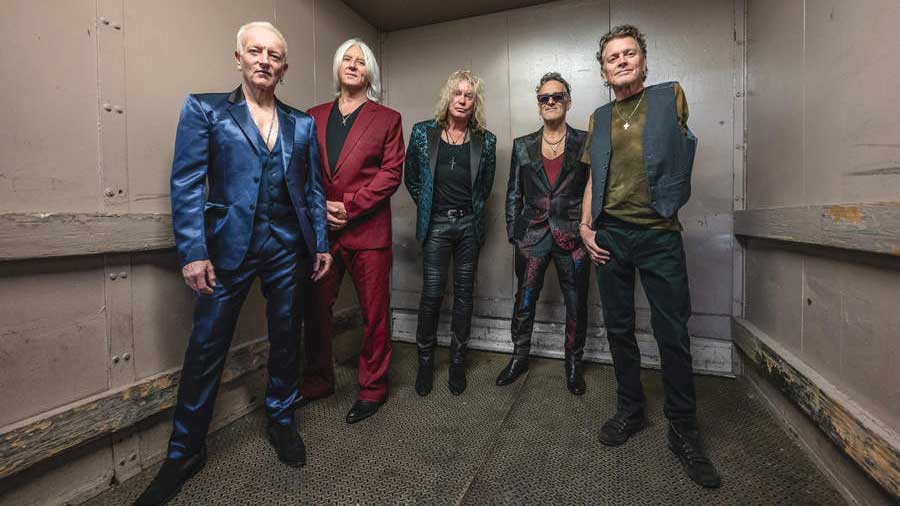
It doesn’t happen very often with Joe Elliott, but for a brief moment, Def Leppard’s singer is lost for words. He and the other four members of the band – guitarists Phil Collen and Vivian Campbell, drummer Rick Allen and bassist Rick ‘Sav’ Savage – are standing on hallowed ground, inside Studio 1 at Abbey Road, where The Beatles created some of their greatest music.
But this is not a regular recording session for Def Leppard. They are here not to play, but to observe. They are positioned on a balcony high above the studio floor. Below, arranged in neat rows, are the musicians of the Royal Philharmonic Orchestra. And as the orchestra plays the melody to one of Leppard’s biggest hit songs, Love Bites, Joe Elliott mouths a silent ‘wow’.
It is a winter day in early 2022, and Def Leppard have invited Classic Rock to Abbey Road to witness the creation of what Joe describes as “the most unusual record we’ve ever made”. Its title is Drastic Symphonies, and as Sav says with a smile: “It is pretty drastic. It’s very symphonic. And we couldn’t really call it Orchestral Manoeuvres In The Dark, could we?”
Other rock bands have done this kind of thing before, most famously Deep Purple – who enlisted the Royal Philharmonic in 1969 for the Concerto For Group And Orchestra, for which the urbane keyboard-playing maestro Jon Lord composed an original score, performed and recorded live at the Albert Hall – and Metallica, who made two live albums with the San Francisco Symphony orchestra, S&M and S&M2 (the titles were an abbreviation of Symphony And Metallica).
Joe Elliott acknowledges this, but speaks of Drastic Symphonies as a similarly ambitious project. “We’re stepping into territory previously visited by other bands of our ilk,” he says. “But we’ve never done anything like this before, and what’s really interesting is how we’ve dug really deep.”
The album features new versions of 16 songs with arrangements by Eric Gorfain, a classically trained violinist and composer who has worked with Jimmy Page and Robert Plant, Neil Diamond, Demi Lovato and more. Most of the tracks on Drastic Symphonies are based on the band’s original master recordings, to which the orchestral parts are added. There are hit songs, but also deep cuts, the oldest of which date all the way back to 1981.
At the end of a long day at Abbey Road with the work done, Joe Elliott explains the method and the thinking behind this project. “It’s all about expanding these songs,” he says. “Most of it is stripping back our backing tracks to allow the orchestra to shine and be at the forefront, because that’s the point of the record. But it’s not just our greatest hits with orchestra on top – like slapping butter on a piece of toast. What we wanted to do with this album is glorify what we’ve done in the past as rock songs, and make them epic.”
Fast forward to spring 2023. A little over a year since the session at Abbey Road Studios – a year in which everyone in and around Def Leppard has kept Drastic Symphonies a closely guarded secret – Joe and Sav are finally free to talk in depth about the album and its creation. Both connect via Zoom from their homes – Joe in Dublin, Sav in Sheffield. What Sav reveals first is that the idea for this album did not come from the band.
“I think it was suggested by our record company,” he admits. “And record companies being record companies, they just wanted our greatest hits with strings on. But once the seeds had been sown, it really started taking off in true Def Leppard style. You throw yourself into it a hundred per cent.”
Joe agrees. “It was never on my bucket list to do an album with an orchestra,” he says, “but this has turned out to be another of the weird things that we’ve done – like a show with Taylor Swift, or a duet with a country singer like Alison Krauss or Tim McGraw. It’s another thing that’s out of the norm for us.”
Once this project was set in motion, the first and most important process was song selection.
“It was all about making sure that we had the right ones,” Joe says. Some choices were no-brainers, such as the ballads Have You Ever Needed Someone So Bad and When Love And Hate Collide – the latter featured strings in its original recorded version. Other logical choices included a number of lesser known album tracks: Gods Of War, Paper Sun, Turn To Dust, Love and Kings Of The World.
“These were epic songs,” Joe says, “so we felt we could really go to town with orchestration because we’d orchestrated them so much originally."
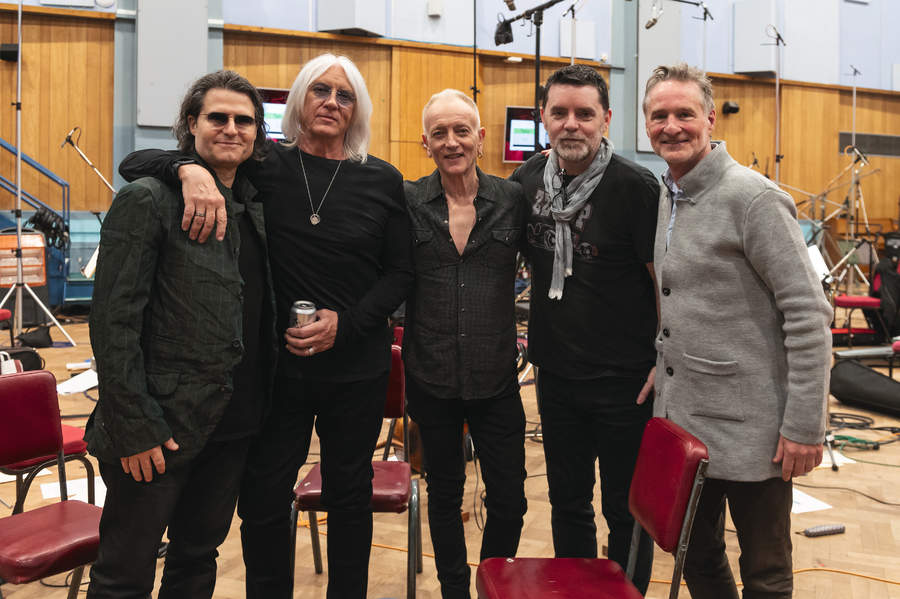
However, in the early stages of working with Eric Gorfain, it quickly became apparent that some of the band’s biggest songs – the rock anthems – would not work in this context.
Gorfain first entered Def Leppard’s orbit when assisting Phil Collen in the production of Tesla’s 2019 album Shock, and working with Joe’s other band Down & Outz on the album This Is How We Roll.
“Eric used to play drums along to our stuff as a kid,” Joe says. “He’s a rocker who does orchestra, rather than a classical guy who’s dipping his toes into rock’n’roll and doesn’t really understand it. So he knew exactly what we were after, especially after working with me and Phil in the past. But when we mocked up orchestral versions of some of the big rock songs, like Photograph and Rock Of Ages, it was hideous! So we said: ‘No, we’re not doing it. It’s got to work or it’s not going on.’”
Sav explains with a shrug: “I know this may sound slightly technical to certain people, but if a song is written in a minor key, it’s easier to fit string parts and be more melodic. But with Photograph and Rock Of Ages, which are very major key songs, an orchestral version just sounds a bit whimsical, even comical. A lot of it comes down to the nature of the song.
"We knew that we could fall down a cliff if we chose the wrong ones. And that’s why this album is so cool, because we didn’t just pick the hits. We picked the ones that really lent themselves to strings and all that drama. And that’s why the album starts with Turn To Dust and Paper Sun, a couple of deep cuts…”
The deepest of these deep cuts is Switch 625, the instrumental track from the 1981 album High ’N’ Dry, written by guitarist Steve Clark, who died in 1991. It is a song that Def Leppard have continued to play over the years in tribute to Clark, and as Joe says of this new version: “It sounds like something from a James Bond movie, because it always did. It was James Bond on guitars. Now it’s James Bond as we all know and love it – with strings.”
Dialling down the guitars and drums was a natural part of this process, to which all parties agreed without fuss.
“In this band,” Joe says, “we’re all man enough as individuals to say, ‘You can take my shit off that track.’ What we did on Animal was strip the drums off. And on other songs, guitars are replaced by strings. So on Hysteria, you’ve got the jangle guitar, but at the beginning of Too Late For Love, the guitar has been replaced by a violin."
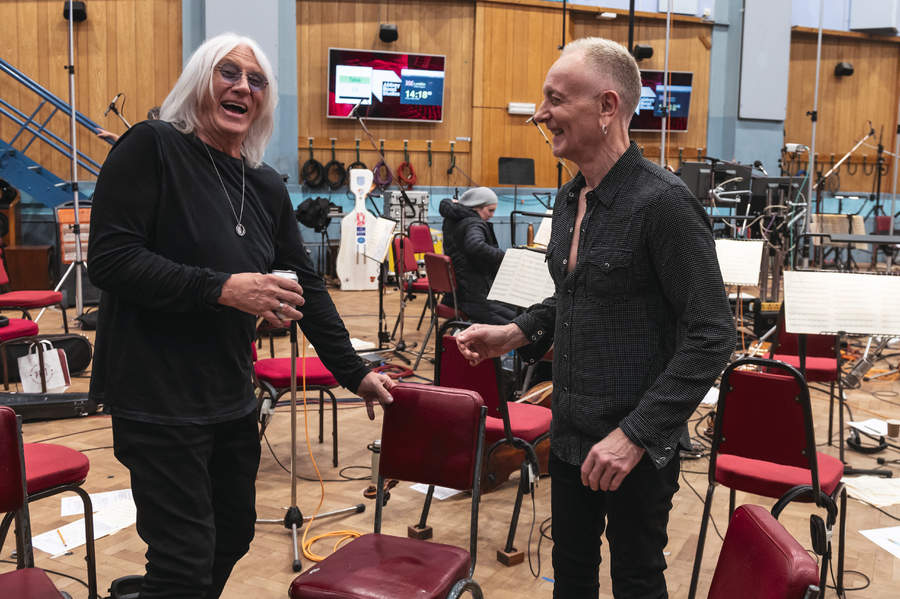
Too Late For Love presented an odd challenge for Joe as a singer – performing a duet with himself.
“Once we did the strings, the original vocal sounded a little too bombastic,” he says. “So I sang a new vocal, which I recorded on this very laptop that I’m talking to you on now. For a guide, I was listening to the isolated vocal that I did with Mutt Lange at Battery studios back in 1982. It was kind of spooky.”
The finished version features both the original vocal and the new.
“So I’m singing with my old self,” Joe says. “That was weird, but in a good way.”
A more orthodox vocal duet is featured in a new version of Pour Some Sugar On Me – described by Joe as “the most radical arrangement” on the album. The other singer is Emm Gryner, a Canadian-Filipino vocalist and multi-instrumentalist who first met Joe when she was a member of David Bowie’s backing band in 1999.
“I went to a Bowie gig in Dublin,” Joe recalls, “and it was Mark Plati, who was Bowie’s bassist and co-producer, who introduced me to Emm. He said, ‘You’ve got to meet her – she’s a huge Leppard fan!’ So we got talking and she said, ‘I’ve done a jazz piano version of Sugar.’
"It was on a covers album she’d made. She did Song 2 by Blur in a way that’s barely recognisable. She even did Crazy Train by Ozzy on a piano! When we heard her version of Sugar we were all blown away. It really worked as an arrangement. So I asked her if she fancied doing her version of Sugar with us. And it was easy to orchestrate because of the way she did it.”
For Joe, this is the most important track on Drastic Symphonies.
“It’s an absolutely brand new version,” he says, “which I think is what the album needed to justify its existence more than anything else.”
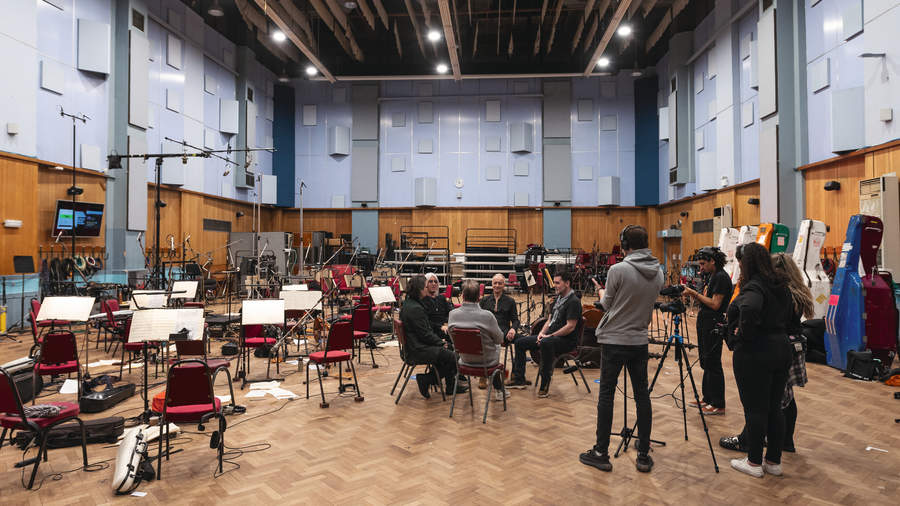
Joe and Sav have watched This Is Spinal Tap countless times. Like every rock band and every rock fan, they know the movie’s dialogue by heart. Both of them laugh when reminded of a line delivered by Tap frontman David St. Hubbins: “I’ve always wanted to do a collection of my acoustic numbers with the London Philharmonic.”
There is more laughter from Sav when he admits that working with musicians of such a high calibre was at times humbling.
“If the whole orchestra just pissed off and left me in the empty room, I might have had a little tinkle on a piano or something,” he says. “But I’m not going to do it in front of somebody that’s studied for years to hone their craft. That would be like me trying to play for Argentina in the World Cup!”
But as Rick Allen said last year at Abbey Road: “I stood in that room, just hearing dry strings, not the songs. It was fucking awesome! I don’t know what is about strings or piano, I always get an emotional response. It hits you in a certain way, like a full-body experience.”
And this was a feeling shared by all during the making of Drastic Symphonies.
“When you walk into Abbey Road, you feel that legacy,” Joe says. “That’s where the magic of the Fab Four was mostly recorded, I Am the Walrus and all that stuff, and so many other wonderful artists, like Pink Floyd making The Dark Side Of The Moon. It feels like you’re standing on the shoulders of giants. And then you’ve got this orchestra in front of you. It’s a big deal! And the most important thing is to be in the moment and enjoy it. You’re watching, listening, learning. And if you walk out of there a better man, happier and more knowledgeable, then you’ve achieved something.”
He recalls the conversations he had with members of the orchestra. “They were excited to do this because it was out of their comfort zone. Instead of playing Beethoven or Brahms or whatever, they’re blasting out Switch 625!” Likewise, this was a wholly new experience for the band.
“We were in awe watching these guys,” Joe says. “Everything sounded so perfect. I remember being down the front at an AC/DC gig at the Sheffield Top Rank in 1976. All I could hear was Angus. And I couldn’t hear for three days afterwards. But with the orchestra, the balances were never out of sync – from the cellos all the way down to a little plinky triangle. You’re just standing there thinking, ‘These guys know what they’re doing.’”
He also found himself wondering how this might sound in a live performance, with band and orchestra. At Abbey Road the musicians of the Philharmonic dressed casually, one even wearing a Def Leppard T-shirt. But as Joe says now, “You start picturing them in tuxedos, at the Albert Hall, and you’re imagining an audience hearing this live the first time. But we’re just happy with how this record has turned out.”
In this, he and Sav stress the importance of Eric Gorfain and another key member of the team, producer Ronan McHugh, who has worked with the band since the late 90s, and shared duties on Drastic Symphonies with Nick Patrick – who produced Royal Philharmonic recordings of the music of Elvis Presley, Roy Orbison, The Beach Boys and more.
“Eric really did give us that fifth dimension,” Joe says. “It changed the dynamic of these songs altogether, which is absolutely what we wanted. And Ronan did such a great job. I remember being in the control room at Abbey Road and seeing the joy on the faces of him and Eric, just beaming with pride at how massive this thing sounded. But of course, the rest of the world doesn’t have the luxury of a room like that to listen to it in. Some of us are just listening with earbuds all day long. So you’ve got to make sure that it still sounds great on whatever you’ve got. And that’s where Roland comes into his own…”
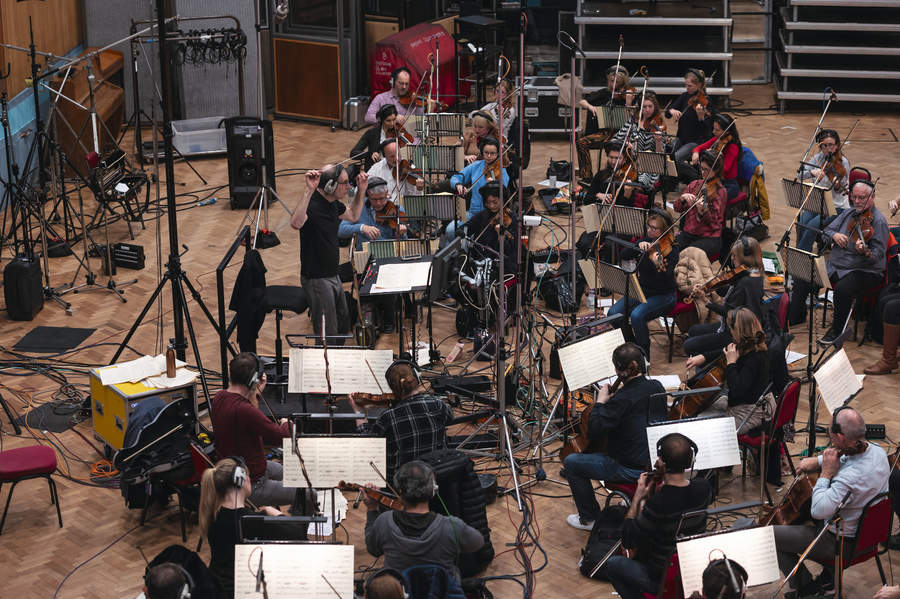
As Sav says, “It was just a great process. Some of these songs, I think, were almost made for orchestras. It’s almost as if we should have put strings on at the time. But we’re a rock band, so we had to be careful about that sort of thing. Until now…”
Ultimately, a project that nobody in Def Leppard had ever considered before has, according to Joe and Sav, turned into something profound.
“Certainly,” Joe says, “there were times when I was listening to the orchestra playing these songs and it brought a lump to my throat.”
There is one moment he recalls most clearly from the Abbey Road sessions: the recording of Love, the beautiful song that Sav wrote in homage to his favourite band, Queen. “In more than forty years of knowing him, I’ve never ever seen Sav take a photograph of anything,” Joe says. “He never does that. But when he heard them playing that song, he got his phone out and filmed it. He was right in there like David fucking Attenborough! It was such a special moment for him.”
Sav smiles at the memory. “I don’t normally get caught up in the emotion,” he says. “But in that particular moment, it just hit me. I looked around thought: this is bloody Abbey Road, this is the Royal Philharmonic Orchestra, and they’re playing my song! It’s something I never could have dreamed of. So it was pretty emotional for me. In all these years I’ve been in this business, doing what we do, that was one of the greatest few minutes of my career.
“Yeah,” he says. “That’s how important it was to me.”
Def Leppard's Drastic Symphonies is released on May 19.







